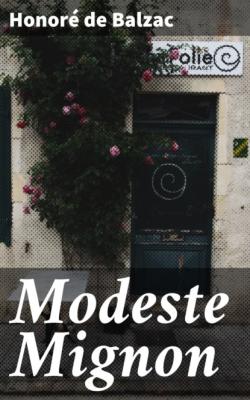Modeste Mignon. Оноре де Бальзак
Читать онлайн.| Название | Modeste Mignon |
|---|---|
| Автор произведения | Оноре де Бальзак |
| Жанр | Языкознание |
| Серия | |
| Издательство | Языкознание |
| Год выпуска | 0 |
| isbn | 4057664601469 |
Honoré de Balzac
Modeste Mignon
Published by Good Press, 2019
EAN 4057664601469
Table of Contents
CHAPTER II. A PORTRAIT FROM LIFE
CHAPTER V. THE PROBLEM STILL UNSOLVED
CHAPTER VI. A MAIDEN’S FIRST ROMANCE
CHAPTER VII. A POET OF THE ANGELIC SCHOOL
CHAPTER IX. THE POWER OF THE UNSEEN
CHAPTER X. THE MARRIAGE OF SOULS
CHAPTER XI. WHAT COMES OF CORRESPONDENCE
CHAPTER XII. A DECLARATION OF LOVE,—SET TO MUSIC
CHAPTER XIII. A FULL-LENGTH PORTRAIT OF MONSIEUR DE LA BRIERE
CHAPTER XIV. MATTERS GROWN COMPLICATED
CHAPTER XVIII. A SPLENDID FIRST APPEARANCE
CHAPTER XIX. OF WHICH THE AUTHOR THINKS A GOOD DEAL
CHAPTER XX. THE POET DOES HIS EXERCISES
CHAPTER XXI. MODESTE PLAYS HER PART
CHAPTER XXII. A RIDDLE GUESSED
CHAPTER XXIII. BUTSCHA DISTINGUISHES HIMSELF
CHAPTER XXIV. THE POET FEELS THAT HE IS LOVED TOO WELL
CHAPTER XXV. A DIPLOMATIC LETTER
CHAPTER XXVII. A GIRL’S REVENGE
CHAPTER XXVIII. MODESTE BEHAVES WITH DIGNITY
The following personages appear in other stories of the Human Comedy.
CHAPTER I. THE CHALET
At the beginning of October, 1829, Monsieur Simon Babylas Latournelle, notary, was walking up from Havre to Ingouville, arm in arm with his son and accompanied by his wife, at whose side the head clerk of the lawyer’s office, a little hunchback named Jean Butscha, trotted along like a page. When these four personages (two of whom came the same way every evening) reached the elbow of the road where it turns back upon itself like those called in Italy “cornice,” the notary looked about to see if any one could overhear him either from the terrace above or the path beneath, and when he spoke he lowered his voice as a further precaution.
“Exupere,” he said to his son, “you must try to carry out intelligently a little manoeuvre which I shall explain to you, but you are not to ask the meaning of it; and if you guess the meaning I command you to toss it into that Styx which every lawyer and every man who expects to have a hand in the government of his country is bound to keep within him for the secrets of others. After you have paid your respects and compliments to Madame and Mademoiselle Mignon, to Monsieur and Madame Dumay, and to Monsieur Gobenheim if he is at the Chalet, and as soon as quiet is restored, Monsieur Dumay will take you aside; you are then to look attentively at Mademoiselle Modeste (yes, I am willing to allow it) during the whole time he is speaking to you. My worthy friend will ask you to go out and take a walk; at the end of an hour, that is, about nine o’clock, you are to come back in a great hurry; try to puff as if you were out of breath, and whisper in Monsieur Dumay’s ear, quite low, but so that Mademoiselle Modeste is sure to overhear you, these words: ‘The young man has come.’ ”
Exupere was to start the next morning for Paris to begin the study of law. This impending departure had induced Latournelle to propose him to his friend Dumay as an accomplice in the important conspiracy which these directions indicate.
“Is Mademoiselle Modeste suspected of having a lover?” asked Butscha in a timid voice of Madame Latournelle.
“Hush, Butscha,” she replied, taking her husband’s arm.
Madame Latournelle, the daughter of a clerk of the supreme court, feels that her birth authorizes her to claim issue from a parliamentary family. This conviction explains why the lady, who is somewhat blotched as to complexion, endeavors to assume in her own person the majesty of a court whose decrees are recorded in her father’s pothooks. She takes snuff, holds herself as stiff as a ramrod, poses for a person of consideration,
